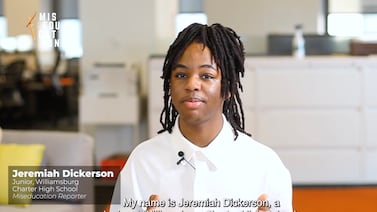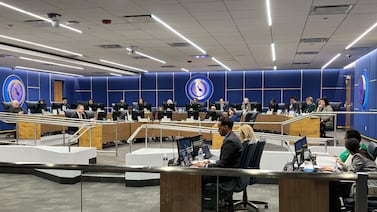High school English language learners in the Detroit school district may receive tutoring services from Paper, an online company that has had a spotty record doing similar work with some school districts nationwide.
In recent weeks, the finance and academic committees of the school board for the Detroit Public Schools Community District have considered a proposal from the administration to contract with Paper for $168,075. The full school board is expected to vote on the contract at a meeting Tuesday.
The company would provide online tutoring for high school students three days a week, while another company called Braintrust Tutors would provide tutoring for language learners in grades K-8.
Paper, one of the biggest virtual tutoring companies in the U.S., rose to prominence in recent years as school districts across the country scrambled to help students recover from the academic losses they experienced during the pandemic. The company says that it provides one-on-one services with tutors who have subject-area expertise.
Some districts, however, have pulled out of contracts with Paper after parents, students, and educators complained about the quality of the service. Complaints include that too few students used the service and that some students struggled to use the mostly text-based chat for help. Tutors also were working with more than one student at a time.
The company has said it works with 300 school districts in the U.S. and Canada, as well as the states of Tennessee and Mississippi.
Sonya Mays, chairperson of the board’s finance committee, raised questions about the Paper contract during a July 26 committee meeting. Mays questioned Superintendent Nikolai Vitti about “a fairly negative article,” about the Columbus School District‘s experience with Paper.
“They pulled the contract because less than 10% of students log into it, which is not a really good use of money,” Mays said.
Vitti said the district is protected against similar problems because “you actually have to serve kids in order to get paid … this is where we ensure financial discipline and accountability.”
Mays said she worries that if students aren’t being served, that is “lost time” when they could have received a more effective intervention.
In an email response to Chalkbeat questions, Vitti expanded on his response at the committee meeting.
“What we have read and determined is that the company had challenges with students attending online sessions,” he said. “Our model of implementation is different. Students will access the service during the school day, which ensures that the services will be used if the student isn’t absent. Adults will be monitoring engagement and participation. The company is only paid for services when tutoring occurs.”
Vitti also said that “it appears as if the help chat feature led to other challenges with the company,” and that DPSCD would not be using that function.
“There will also be active monitoring of the implementation model by teachers, school and district administrators,” Vitti said.
Many school districts hired Paper with COVID relief dollars to provide virtual tutoring to students. Some school leaders who struggled to hire in-person tutors saw promise in a company that said it could reach lots of students for a lower price point than other tutoring services.
At one point, the company held contracts worth tens of millions of dollars and counted four of the nation’s 10 largest school districts as clients. But the company has faced a number of critiques from parents, students, and educators.
Some districts have reported that few students used the tutoring, which resembles a text-based instant messenger with the option to draw on an interactive whiteboard. Some younger children and English language learners have struggled to use the platform, which does not offer live video or two-way audio.
Some parents have complained that their kids were left waiting a long time to connect with a tutor and that their tutor offered incorrect help. A Chalkbeat investigation found that Paper tutors were often trying to help four or more students at the same time and that tutors sometimes were paired with students who needed help in subjects they did not know.
Paper told Chalkbeat last summer that it’s rare for tutors to work with more than three kids at once and that it’s uncommon for students to be paired with a tutor who lacks the right subject matter expertise. A spokesperson for the company didn’t respond to a request for comment about the Detroit contract.
In DPSCD, the virtual tutoring provided by Paper and Braintrust is part of a comprehensive approach to improving literacy that includes the use of academic interventionists to provide one-on-one and group support to students. The district is hiring more interventionists for the coming school year in part to provide more support to English language learners.
Vitti said Paper was selected through the district’s request for proposals process.
“Along with submitting materials to a committee for review, Paper was required to provide a live demo lesson with District ELL students, ELL teachers, and a principal with a high ELL population along with IT staff,” Vitti said in an email.
“This was done to demonstrate their capacity to deliver scaffolded on grade level lessons to ELL students. During their live demo, the vendor delivered content rich, engaging, grade level instruction in two languages to support students’ learning. A lesson from our curriculum was actually used. The reviewers felt Paper was the best service to select through this vetting process.”
Chalkbeat reporter Kalyn Belsha contributed to this story.
Lori Higgins is the bureau chief for Chalkbeat Detroit. You can reach her at lhiggins@chalkbeat.org.






